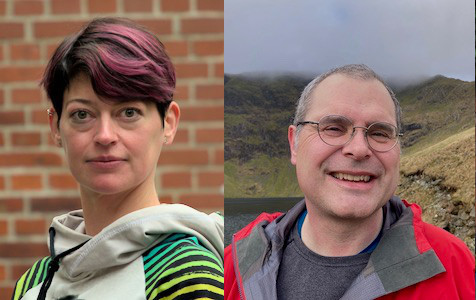CECAM-MARVEL Mary Ann Mansigh series: Science writing and science editing - from journals to journalism
Zoom link (no registration needed):
https://epfl.zoom.us/j/69623560691?pwd=QWkwckkvT3BmanY3b3RSTUl4L1dWUT09
___
Science editors and writers play an essential role in the ecosystem of scientific information. Research journals rely on editors who assess manuscripts, shepherd them through peer review, prepare them for publication and create secondary content around them. Journalistic media rely on science writers who can recognize newsworthy scientific stories and bring them to their readers, while applying critical scrutiny to the work of scientists
Learning how journal editors and science journalists work, and how to relate with them, is an important skill for young scientists. Journal editing, journalism and communication also represent potentially interesting career paths for anyone who has scientific training.
In this conversation, a senior editor for a major physics journal and a science journalist with a long experience in major outlets – respectively with a physics and chemistry research background - will describe how their job plays out, how an editorial team is organized in publications such as Nature, Nature Physics or Chemistry World, and how both science publishing and science journalism are being transformed by new technologies and market dynamics.

The Speakers
Nina Meinzer
Nina Meinzer is Senior Editor and Team Leader at Nature Physics. They obtained their PhD from the Karlsruhe Institute of Technology, where they studied plasmonic metamaterials and their interaction with semiconductor quantum heterostructures. They also carried out postdoctoral work at the University of Exeter, working on hybrid systems that combine plasmonic structures and emitters as well as studying microwave metamaterials. In 2016 they joined Nature Communication as Associate Editor, and in 2019 moved to Nature Physics as Senior Editor. They are editorially responsible for the full range of optical physics content the journal publishes, and also oversee the secondary content produced by all editors.
Mark Peplow
Mark Peplow is a science journalist and editor with over 20 years of experience. He has a masters degree in chemistry from the University of Oxford, a PhD in organometallic chemistry from Imperial College London, and spent a year as a post-doctoral fellow at McMaster University, Canada, studying the chemistry of technetium radiotracers. He also holds an MSc in Science Communication from Imperial. He was the editor of Chemistry World magazine from 2006 to 2008, and then became chief news editor at Nature magazine, where he ran the global news team. He turned freelance in January 2013 and is now a regular contributor for Nature, Chemical & Engineering News and many other publications, writing mostly about chemistry, materials and cleantech.
Program
The program for the afternoon will be:
15:00 — Introduction
15:10 — Nina Meinzer – The journal editor’s perspective
15:40 — Mark Peplow – The science journalist’s perspective
16:10 — Break
16:20 — Discussion and interview
17:30 — Aperitif
The event can be attended live at BCH2103 (Batochime building) on the EPFL Campus or online:
Zoom link (no registration needed):
https://epfl.zoom.us/j/69623560691?pwd=QWkwckkvT3BmanY3b3RSTUl4L1dWUT09
The Format
The Mary Ann Mansigh Conversation series focuses of non-strictly technical topics of cultural interest for the simulation and modelling community. The format reflects the informative and informal nature of these sessions, with talks introducing the subject followed by a conversation between the speakers and the audience.

Previous CECAM and MARVEL lectures can be found at:
https://www.materialscloud.org/learn/sections/Btmngu/marvel-events
Low-volume newsletters, targeted to the scientific and industrial communities.
Subscribe to our newsletter